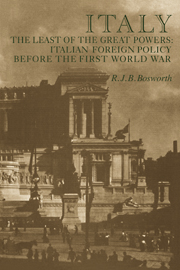Book contents
- Frontmatter
- Contents
- Dedication
- Preface
- List of maps
- 1 Society and politics in Liberal Italy
- 2 New political pressure groups and foreign policy
- 3 The making of a Foreign Minister: Antonino Di San Giuliano
- 4 The Consulta: the bureaucrats of foreign policy
- 5 How Italy went to Libya
- 6 How Italy stayed in Libya
- 7 The politics of alliance: Italy in the Triple Alliance, 1912–1914
- 8 The politics of friendship: Italy, the Triple Entente, and the search for a new Mediterranean agreement, 1911–1914
- 9 ‘Un cliente maleducato’: Italy in the Dodecanese and Ethiopia, 1912–1914
- 10 Preparing to digest some spoils: Italian policy towards Turkey, 1912–1914
- 11 San Giuliano's epilogue. The realities of European war 28 June to 16 October 1914
- Conclusion
- Appendix I The Ten Commandments for Italians abroad
- Appendix II Pro-memoria on our politico-military situation, by A. Pollio
- Appendix III San Giuliano's poem about his funeral ceremony
- Abbreviations used in the notes and bibliography
- Select bibliography
- Notes
- Index
5 - How Italy went to Libya
Published online by Cambridge University Press: 16 November 2009
- Frontmatter
- Contents
- Dedication
- Preface
- List of maps
- 1 Society and politics in Liberal Italy
- 2 New political pressure groups and foreign policy
- 3 The making of a Foreign Minister: Antonino Di San Giuliano
- 4 The Consulta: the bureaucrats of foreign policy
- 5 How Italy went to Libya
- 6 How Italy stayed in Libya
- 7 The politics of alliance: Italy in the Triple Alliance, 1912–1914
- 8 The politics of friendship: Italy, the Triple Entente, and the search for a new Mediterranean agreement, 1911–1914
- 9 ‘Un cliente maleducato’: Italy in the Dodecanese and Ethiopia, 1912–1914
- 10 Preparing to digest some spoils: Italian policy towards Turkey, 1912–1914
- 11 San Giuliano's epilogue. The realities of European war 28 June to 16 October 1914
- Conclusion
- Appendix I The Ten Commandments for Italians abroad
- Appendix II Pro-memoria on our politico-military situation, by A. Pollio
- Appendix III San Giuliano's poem about his funeral ceremony
- Abbreviations used in the notes and bibliography
- Select bibliography
- Notes
- Index
Summary
When San Giuliano was recalled from Paris in March 1910 he cannot have expected to hold office for long. During the previous decade Italian politics had developed a clear pattern. Giolitti was Prime Minister for most of the time, and always controlled a parliamentary majority. When he was not in office, succession passed briefly to the more conservative, more scrupulous and more blinkered Sonnino, or to one of Giolitti's ‘lieutenants’, Alessandro Fortis or Luigi Luzzatti. Fortis and Luzzatti were eminent politicians, with careers and ideas of their own, but they possessed neither Giolitti's power base, nor Sonnino's ‘principles’. A number of Cabinet Ministers held office from one government to another, but Foreign Ministers changed with fair regularity. Tittoni worked with Giolitti, Guicciardini served Sonnino. San Giuliano was Foreign Minister for Fortis or Luzzatti.
Luzzatti's government had no particular foreign ambitions. Salandra, disappointed not to find a place in the Ministry when he was available, complained that Luzzatti was too pro-French. Barrère, he noted sulkily, was the real creator of the Ministry. It was true that Luzzatti had ties to the traditions of Visconti Venosta and the Francophilia of the Destra, but these were no longer important in 1910. Indeed the garrulous Prime Minister, a Jew, a financial expert and an intellectual patron of many congresses, was as friendly to Germany as to France.
During his career Luzzatti had commented intermittently on foreign affairs. He had disliked Crispi's ‘grand design’, but he congratulated Prinetti for his convoluted treatying in 1902. ‘We must renew the Triplice and observe it loyally’, he had noted, ‘we must bind ourselves always more in friendship with France. And I believe that both are feasible’.
- Type
- Chapter
- Information
- Italy the Least of the Great PowersItalian Foreign Policy Before the First World War, pp. 127 - 164Publisher: Cambridge University PressPrint publication year: 1979

